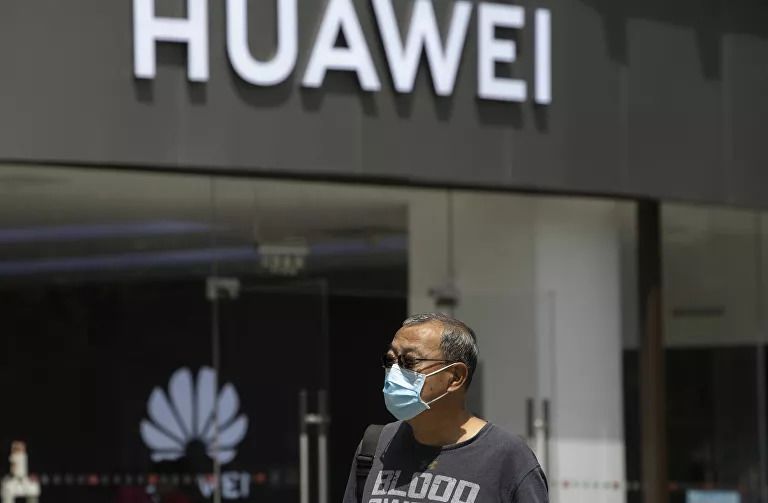
Ex-Diplomat Reveals How Trump Administration Managed to Persuade EU States to Ditch Huawei's 5G
When the Trump administration started its crackdown against Chinese telecommunication giant Huawei, one of its main foreign policy lanes focused on persuading allies and other countries that the equipment poses a national cybersecurity threat and that they must ditch it when building 5G networks, necessary for the next generation of high-tech equipment, from smart houses and self-driving cars to surgical procedures being conducted by a robot being guided by a doctor thousands of miles away.
Washington's original push was focused on putting pressure on allies, threatening to remove them from intelligence-sharing programmes such as the Five Eyes Community, if they did not ditch Huawei whose prices were competitive and which was one of the leading businesses in its field.
 In this May 18, 2020, file photo, a man wearing a face mask to protect
against the coronavirus walks past a Huawei retail store in Beijing
In this May 18, 2020, file photo, a man wearing a face mask to protect
against the coronavirus walks past a Huawei retail store in Beijing
This US approach, however, sparked a significant backlash; although some countries, such as South Korea, immediately acquiesced to Washington's demands, others, such as Germany, France and the UK, initially dug their heels in. The US was losing the fight as Huawei announced 91 deals - half of them in Europe - by the time Trump's administration initiated the crackdown on the Chinese company's 5G market expansion in March 2019.
The European states continued to resist US pressure, even when their own security agencies expressed concern over the share Huawei's equipment would have in the 5G networks, and it was apparent that Washington's rambunctiousness was not working, as Keith Krach, the former US undersecretary of state who led America's anti-Huawei policy, revealed in his interview with Politico.
"The approach had been to pound the table and tell people, 'Don't buy Huawei!' It was a confrontational style," Krach explained.
However, according to the former diplomat, the US softened its approach at some point, starting to treat foreign partners as "customers", making them and their local carriers "a value proposition". Krach explained that the work with the local service providers allowed Washington to skip the government level in talks, convincing carriers to avoid the Huawei equipment instead.
"After a while, we could see it was creating a critical mass, a tipping point," Krach said.
Eventually, one by one, the European countries started to be won over by the US's persuasion – first in eastern Europe and then reaching earlier strong opponents of the move – the UK and France, the former undersecretary said. Eventually, a similar initiative was launched at Brussels level. The scale of anti-Huawei action differed from country to country – some banned the tech giant's equipment outright whereas others severely limited its use.
Now, with the arrival of Joe Biden's new administration, the situation is unlikely to change – the White House already announced it is planning to confront China on a number of issues. Biden's nominee for commerce secretary, Gina Raimondo, has already said that the new administration will not change the US's stance on Huawei's participation in the global 5G network rollout, which had been set up by Trump's team. This means that Washington will continue to accuse the tech giant of planting backdoors in its equipment to allow Beijing to spy on Huawei's clients, and try to convince other countries of it. Huawei and the Chinese authorities, in turn, will apparently continue to fight the US allegations, which they say are unsubstantiated and false.










